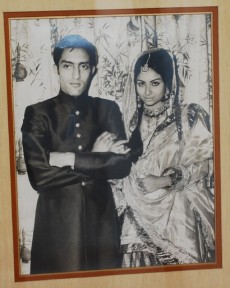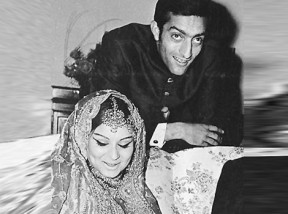Far before the debate warmed up about pregnant heroines signing films at all, there was Sharmila Tagore, visibly pregnant and carrying Saif Ali Khan Pataudi through the shoot of Asit Sen’s Safar. Decades before film magazines wondered if a married heroine could pull off roles beyond her comfort zone, there was Ms Tagore again, playing a sultry sex worker in Gulzar’s Mausam, mouthing expletives as she threw off a non paying customer off her seedy brothel’s stairs, curls of beedi smoke framing her gaunt, angry, bitter face. No one could have guessed that she was blissfully settled in matrimony and motherhood by then. And was infact the Begum of Pataudi.
For an aristocratic Tagore beauty handpicked by Satyajit Ray to star in some of world cinema’s greatest films, the journey to the world of Shakti Samanta’s cosmetic Kashmir Ki Kali and a swimsuit in An Evening in Paris was a quiet assertion of choices she wanted to make. There were no loud proclamations about what women of her ancestry could do or not. Sharmila Tagore did what her heart told her even if it seemed defiant and radical to the point of stupidity as when she chose to marry a statuesque Nawab after a courtship that included impromptu flights across continents, Ms Tagore running across a cricket field during a match to hug her beau and a few years of weighing what an inter-religious marriage could do to two fiercely independent individuals who were wildly successful in their own right, had the world at their feet and did not need to cut their individuality to fit into the stifling confines of domesticity.
When the two met, Mansoor Ali Khan Pataudi did not really know the extent of his lady’s success in films though he did love Hindi film music. There were also his memories of a mob closing in for a kill during a Hindu Muslim riot in 1947 but love was above considerations that divide countries and shed blood and vestiges of humanity.
The two, as Sharmila was to share later, were not making an intentionally secular statement. They just wanted to be together. And yes, much drama followed the announcement of their wedding.Two CID officers were sent to protect Sharmila Tagore and later the Shankaracharya of Puri excommunicated her even though the man she was marrying was the captain of the Indian cricket team. It wasn’t enough ostensibly because he was not Hindu. They married in the neutral climes of Kolkata anyway, in a friend’s place amid cynical comments about how fickle such mismatched romances were. The romance ofcourse would last for over 42 years. There was a religious conversion before the wedding but nothing that followed in the subsequent years curtailed Sharmila Tagore from being her own person. From working as often or as infrequently as she wanted to.
Though she was bonafide superstar and he was possibly the most charismatic Indian captain to grace a cricket field ever, they made their marriage work like any other couple. Giving up things they were used to before they got married to invest in their relationship. Moving from an independent life in Mumbai to Delhi where they set up home in a household run by Mansoor’s mother. If it was tough, we have never heard about it because the couple pulled it off.
For those of us who did not know the two personally, their story was still one of enduring hope and joy. A story that told us that love could triumph no matter what the odds if the people in question put it above every other consideration. During the era when Sharjah fixtures were consumed hungrily by addicted cricket fans, one moment lingers in my memory. Tiger Pataudi was in the commentator’s box and the camera was lingering on pretty faces in the crowd, evoking cheeky comments from his colleagues. “And that right there is my wife,” he said firmly just incase anyone was going to overlook the presence of his begum amid all the glamour.
Their marriage like them aged gracefully, beautifully. And today even though he is no more, their love story has not really ended. In our mind, he is still the exquisitely aquiline Nawab who whisked away one of the most beautiful women in the Indian film industry and gave her a fairy-tale love story to live and blossom in. And a happily ever after to call her own.
Reema Moudgil is the author of Perfect Eight (http://www.flipkart.com/b/books/perfect-eight-reema-moudgil-book-9380032870?affid=unboxedwri )







